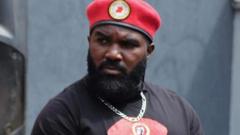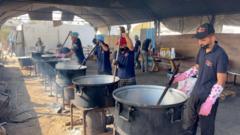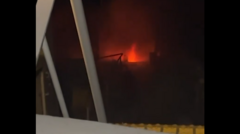Growing opposition among Israeli reservists highlights a critical shift in public sentiment towards the ongoing Gaza war, as more voices urge the government to prioritize hostage negotiations over military engagements.
Israeli Reservists Demand End to Gaza War, Urging Focus on Hostage Negotiations

Israeli Reservists Demand End to Gaza War, Urging Focus on Hostage Negotiations
Concerns Mount as Military Reservists Call for Shift in Government Strategy Amidst Ongoing Conflict
In recent weeks, a significant number of Israeli reservists from all branches of the armed forces have publicly voiced their dissent against the ongoing military actions in Gaza. Over 12,000 reservists, including those from elite combat and intelligence units, have signed letters urging Prime Minister Benjamin Netanyahu to cease hostilities and focus on securing the release of 59 hostages being held by Hamas. Previously, the rationale for the war was widely accepted among Israelis as necessary to defeat Hamas and secure the return of hostages, but sentiment is shifting as the conflict persists.
Danny Yatom, a former head of Israel's Mossad agency and notable critic of the prime minister, shared his views on the situation. Echoing concerns expressed by many reservists, Yatom pointed out that Netanyahu's political interests seem to overshadow urgent humanitarian needs. "Every day that passes is further risking their lives. Every moment of hesitation is a crying shame," he noted in reference to the hostages.
The first letter, signed by air force reservists, highlighted that continuing the war does not align with its declared goals and jeopardizes the lives of those still captive. This public outcry is part of a wider trend, as hundreds of thousands of reservists initially rallied to support national defense but are now beginning to refuse service, indicating a dangerous drop in military volunteerism unprecedented since the early 1980s.
Amidst the growing movement, a reservist identified only as "Yoav" spoke out, lamenting the moral dilemmas faced by soldiers during the prolonged conflict. "It's not about beating Hamas. It's about losing our country," he stressed. This reflects a larger discourse on the ethics of military action and moral obligations faced by soldiers, with some senior military figures suggesting potential disobedience to orders under the current circumstances.
Polls indicate a rising public appetite for a ceasefire and negotiations focused on the hostages' release, suggesting that the priorities of both the military and civilian populations may be misaligned with the government's current path. Tensions reached a boiling point when Israeli police attempted to restrict protest imagery relating to civilian casualties in Gaza, a move they quickly rescinded following public backlash.
Despite these pressures, Netanyahu remains steadfast in his commitment to military action as the only solution to ensure the hostages' safe return, emphasizing the complexity of navigating public dissent and national security. As the situation evolves, the interplay between military strategy and community sentiment will play a crucial role in shaping the future of Israel and its ongoing conflict with Hamas.
Danny Yatom, a former head of Israel's Mossad agency and notable critic of the prime minister, shared his views on the situation. Echoing concerns expressed by many reservists, Yatom pointed out that Netanyahu's political interests seem to overshadow urgent humanitarian needs. "Every day that passes is further risking their lives. Every moment of hesitation is a crying shame," he noted in reference to the hostages.
The first letter, signed by air force reservists, highlighted that continuing the war does not align with its declared goals and jeopardizes the lives of those still captive. This public outcry is part of a wider trend, as hundreds of thousands of reservists initially rallied to support national defense but are now beginning to refuse service, indicating a dangerous drop in military volunteerism unprecedented since the early 1980s.
Amidst the growing movement, a reservist identified only as "Yoav" spoke out, lamenting the moral dilemmas faced by soldiers during the prolonged conflict. "It's not about beating Hamas. It's about losing our country," he stressed. This reflects a larger discourse on the ethics of military action and moral obligations faced by soldiers, with some senior military figures suggesting potential disobedience to orders under the current circumstances.
Polls indicate a rising public appetite for a ceasefire and negotiations focused on the hostages' release, suggesting that the priorities of both the military and civilian populations may be misaligned with the government's current path. Tensions reached a boiling point when Israeli police attempted to restrict protest imagery relating to civilian casualties in Gaza, a move they quickly rescinded following public backlash.
Despite these pressures, Netanyahu remains steadfast in his commitment to military action as the only solution to ensure the hostages' safe return, emphasizing the complexity of navigating public dissent and national security. As the situation evolves, the interplay between military strategy and community sentiment will play a crucial role in shaping the future of Israel and its ongoing conflict with Hamas.


















